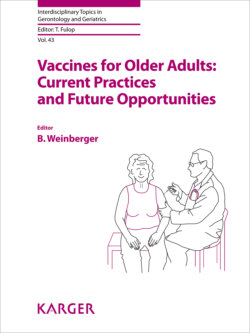Читать книгу Vaccines for Older Adults: Current Practices and Future Opportunities - Группа авторов - Страница 14
На сайте Литреса книга снята с продажи.
Monocytes
ОглавлениеMonocytes are a heterogeneous subset of circulating myeloid cells that can infiltrate tissues and differentiate into macrophages or DCs. Their normal functions include phagocytosis, antigen presentation, and cytokine production. Multiple subsets of monocytes can be found in human blood at different stages of differentiation and maturity that are distinguishable by CD14 and CD16 expression [22]. Monocytes from older subjects have reduced production of cytokines after TLR1/2 stimulation that was associated with reduced surface TLR1 expression [23]; a generalized alteration in TLR-induced CD80 and CD86 expression correlates with reduced responses to influenza vaccination [24]. Monocytes from older subjects also have significantly diminished IFN-α/β responses to RIG-I stimulation [25]. Interestingly, these same monocytes retain the ability to produce proinflammatory cytokines upon stimulation, suggesting that aging may lead to cell-intrinsic dysregulation specifically in the IFN arm of this response [25, 26]. As there is no evidence of altered basal IFN expression with age, impaired IFN induction is representative of a model of age-related reduced dynamic range distinct from that of TLR-mediated proinflammatory cytokine induction. However, a significantly higher percentage of unstimulated monocytes from older donors exhibited nuclear NF-κB (p65) translocation, i.e. a higher activation status at baseline, and these cells secreted significantly more TLR5-induced IL-8 compared to monocytes from younger individuals [27], representing a possible avenue for vaccine adjuvant design. The age-related defects in monocytes have not yet been reported in other innate immune cells and highlight that each cell subset accumulates its own functional defects ultimately culminating in impaired innate immune protection during aging.
